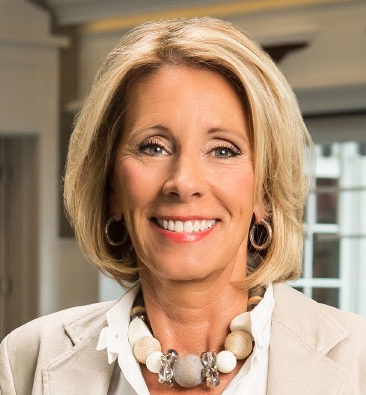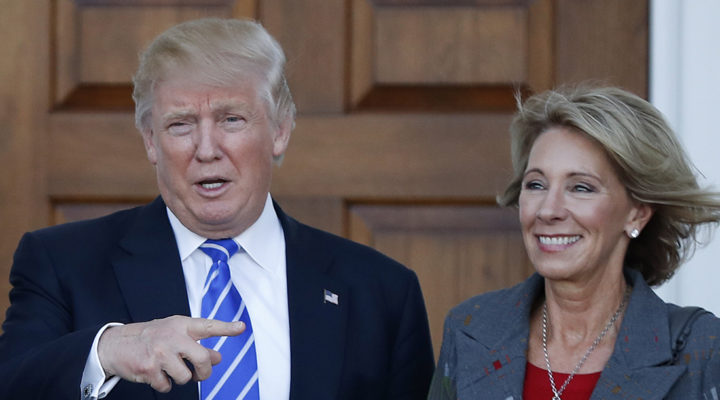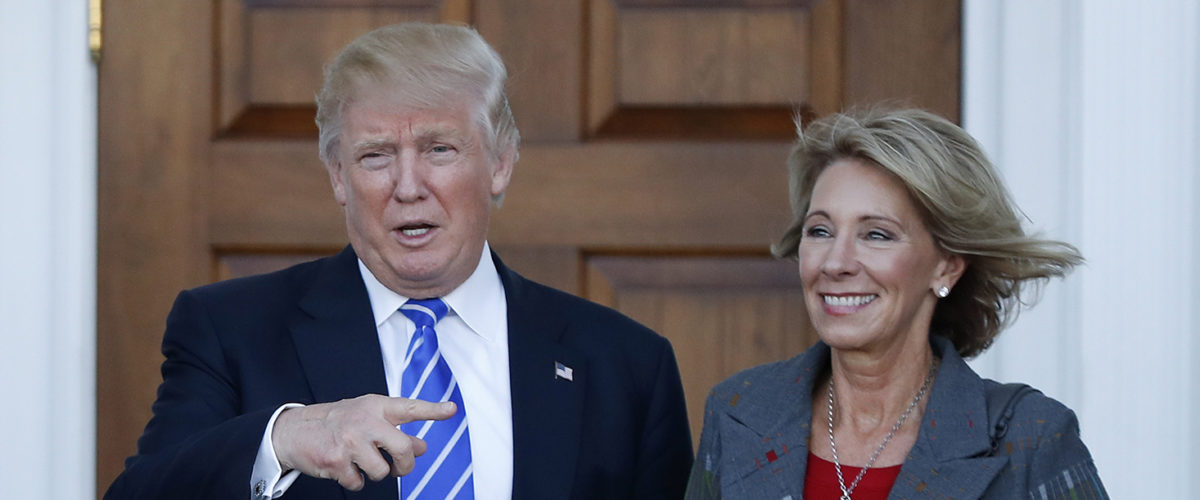Liberty University President Jerry Falwell Jr. says he turned down an offer to become Donald Trump’s education secretary before the president-elect offered the job to school voucher advocate Betsy DeVos.
Falwell, one of Trump’s earliest evangelical supporters, told the Associated Press that Trump offered him the job during a recent meeting in New York but wanted a four- to six-year commitment. Falwell said he couldn’t leave the private Christian school in Lynchburg, Va., founded by his father for more than two years and didn’t want to move his family.
Opponents to Falwell’s potential appointment based on his embrace of young-earth creationism and opposition to a law barring tax-exempt organizations like churches from partisan politicking found little comfort in Trump’s Nov. 23 announcement that he plans to nominate DeVos, a leader in the self-described school reform movement for more than two decades, to head up the U.S. Department of Education.
Barry Lynn, executive director of Americans United for Separation of Church and State, called her appointment “an insult to public education.”
Kary Moss, executive director of the American Civil Liberties Union of Michigan, denounced school vouchers as “a misguided idea that diverts taxpayer dollars into private and parochial schools and perverts the bedrock American value of separation of church and state.”

Betsy DeVos
“We believe that all children have a right to a quality public education, and we fear that Betsy DeVos’ relentless advocacy of charter schools and vouchers betrays these principles,” Moss said.
DeVos, a former Michigan Republican Party chairwoman, leads the American Federation for Children, an organization launched in January 2010 to advocate for public funding of charter schools — which receive public funds but operate independently of the local public school system — and policies and programs to provide taxpayer-funded scholarships for children to attend private schools.
“For more than 20 years, Betsy has fought relentlessly for the right of every child — especially disadvantaged children — to receive a quality education of their parents’ choice,” said John Kirtley, vice chairman of the American Federation for Children. “We are confident Betsy will take the same passion, commitment and leadership she’s shown in the school choice movement to the helm of the U.S. Department of Education.”
Advocates for public education say the movement takes away money from already under-funded public schools. Religious liberty watchdogs like the Baptist Joint Committee for Religious Liberty say the “two-fold mission” of parochial schools — to provide both basic education and religious instruction — makes taxpayer support constitutionally problematic.
“The BJC continues to defend the religious schools’ freedom to carry out their dual mission,” BJC staff counsel Jennifer Hawks wrote in the March 2015 issue of Report from the Capital. “Opposition to vouchers is a necessary part of this effort.”
“All of us deserve the right to choose religious schools for our children, but we don’t have the right to insist that others pay for it through taxpayer-funded vouchers,” Hawks said.
DeVos, daughter of a wealthy industrialist and sister of Blackwater USA founder Erik Prince, is married to Dick DeVos, heir to the fortune of Amway founder Richard DeVos, valued at about $6 billion. They have four children, none of whom attended public school.
Born Elizabeth Prince, DeVos attended Holland Christian High School, a non-denominational private school in Holland, Mich., founded in 1901. She also attended a private Christian college, earning a bachelor’s degree in business administration and political science from Calvin College, a school in Grand Rapids, Mich., named after 16th-century Protestant reformer John Calvin.
Calvin College is affiliated with the Christian Reformed Church in North America, a denomination of more than 1,000 congregations across the United States and Canada with an aggregated membership of 300,000 people.
A beliefs page on the Christian Reformed Church website describes a “Reformed accent” which holds “a very high view of God’s sovereignty: God’s plan, God’s will, God’s power.”
“Everything that happens in the world, from the acts of nations to the faith of individuals, is ultimately under God’s sovereign control,” the article explains.
“We find it very comforting that God’s infinite love and grace is coupled with God’s power and ability to work on our behalf. You see, we know that no human thought or speech or action or desire is completely free of the effects of the fall. Even our will is tainted. Therefore we cannot help ourselves; we are ‘dead in our trespasses and sins’ (Ephesians 2:1). Our only hope, then, is to admit that we have a sin problem, that we are powerless to help ourselves, and that we need to ask for God’s intervention. Since God has already stirred such a desire in us, we are sure that he will answer our cry.”
According to the Washington Post, DeVos has been a member and an elder at the large nondenominational Mars Hill Bible Church in Grand Rapids, which was formerly led by popular author Rob Bell.
Rob Boston, director of communications at Americans United for Separation of Church and State, said Trump’s short list for education secretary doesn’t bode well for the separation of church and state.
“By offering important positions to people like Falwell and DeVos, who not only don’t prioritize public education but seem to disagree with its core mission, Trump has exposed his true colors,” Boston wrote on AU’s Wall of Separation blog. “We can expect at least four years of an Education Department that focuses on private institutions while the public schools that serve 90 percent of our children are an afterthought.”
Lynn, an ordained minister in the United Church of Christ, labeled DeVos “a divisive figure who has spent much of her career working to privatize public education.”
“Ninety percent of American children rely on public schools for an education,” Lynn said. “The country deserves an Education Secretary who will advocate for those children and their families and represent their interests. Instead, we have an ideologue who favors privatizing education.”
Lynn said private school vouchers “violate the fundamental principle of religious freedom because they fund religious education with taxpayer dollars.”
“This is indeed a dark day for public education in America,” he said.
Previous story:


